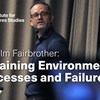degree
Uncovering the degree of criminal organization: Swedish street gangs and the role of mobility and co-offending networks
Social Science Research Abstract In this study we investigate organized crime by studying the degree of criminal organization. We use population-level register data on criminal suspicions between 2011 a
Degrees of Incommensurability and the Sequence Argument
In: Mosquera, J. & O. Torpman (ed.),Studies on Climate Ethics and Future Generations vol. 6. Working Paper Series 2024:10–17 Abstract Parfit (2016) responded to the Sequence Argument for the Repugnan

Simon Karlsson
I hold a master's degree in psychology and a bachelor's degree in political science and psychology. At the Institute for Futures Studies, I work in the research group led by Pontus Strimling. My respons
A Weighted Configuration Model and Inhomogeneous Epidemics
2011. Journal of Statistics Physics 145:1368-1384. AbstractA random graph model with prescribed degree distribution and degree dependent edge weights is introduced. Each vertex is independently equipped

Andrea S. Asker
I am a researcher at the Institute for Futures Studies and will be conducting a postdoctoral research project within the philosophy of death at Hitotsubashi University in Tokyo during the fall of 2025

Felicia Fahlin
I work as a research assistant in the collaborative, art-based projectGhost Platform: Generating the "Complex Image" of Data, Labour, and Logistics,a projectwhich aims to illuminate the hidden human r

Lily Wahlman
I work with criminology professor Jerzy Sarnecki, in the project "Effects of SIG in Stockholm". The aim of the project is to improve the state of knowledge about social action groups (SIG). SIG is a m

Lucia Karens
I have a bachelor's degree in Engineering Physics. I am currently finishing my Master's degree in Machine Learning. At the Institute for Futures Studies, I work as a research assistant for the project E, led by . The aim of the project is to investigate how stereotypes about minority and immigrant groups have evolved over time in Sweden and Finland, by analysing several decades' worth of newspaper articles. My main tasks are running the quantitative analysis of the data with various machine learning methods, as well as visualizing the results.
Malcolm Fairbrother: Explaining Environmental Successes and Failures
Venue:Institutet för framtidsstudier, Holländargatan 13, 4th floor, Stockholm, or online. Research seminar with Malcolm Fairbrother, Professor of Sociology, researcher at the Institute for Futures Stud

Malcolm Fairbrother: Explaining Environmental Successes and Failures
Research seminar with Malcolm Fairbrother, Professor of Sociology, researcher at the Institute for Futures Studies. Abstract Why has the world failed so disastrously on climate change? Humanity has su








